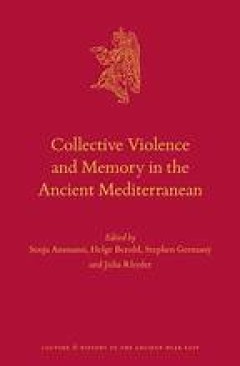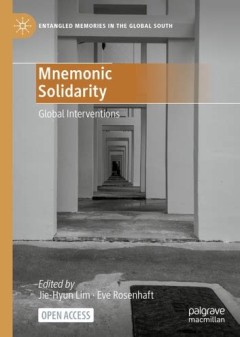Filter by

“The Truth about the Desert”: Exile, Memory, and the Making of Communitie…
"The Truth about the Desert explores the living conditions under which Tuareg refugees from northern Mali rebuild their lives in the Nigerien diaspora and how these conditions affect their self-understandings and cultural practices, established status hierarchies, and religious identity formation. The book counterbalances an earlier scholarly preoccupation with Tuareg nobility by zoning in on t…
- Edition
- -
- ISBN/ISSN
- 9783946198352
- Collation
- -
- Series Title
- -
- Call Number
- -

Tourism as Memory-Making = Russian Tourism in the Shadow of Empire
Until recently the Russian Federation used to be one of the largest markets for outbound travel. Among Russians’ favourite destinations were cities that used to be part of the Russian Empire and the Soviet Union, and are now located in the independent nation-states bordering Russia. This open access book provides an empirically rich and conceptually sophisticated account of the mnemonic inter…
- Edition
- -
- ISBN/ISSN
- 9783031837388
- Collation
- XV, 221 hlm,: ill, lamp; 21 cm
- Series Title
- -
- Call Number
- -

Memory and the Gothic Aesthetic in Film
This open access book defines the cinematic Gothic as an aesthetics of memory and exile. Guided by three intersecting concepts – memory, travelling, and touch – it suggests that the cross-border movements of exiles, émigrés, and professional travellers had a crucial impact on the emergence, development, and dissemination of the Gothic. This approach expands the canon to overlooked films, …
- Edition
- 1
- ISBN/ISSN
- 978-3-031-73628-5
- Collation
- oer.unej.ac.id
- Series Title
- Palgrave Gothic
- Call Number
- -

Collective Violence and Memory in the Ancient Mediterranean
This book reveals how violent pasts were constructed by ancient Mediterranean societies, the ideologies they served, and the socio-political processes and institutions they facilitated. Combining case studies from Anatolia, Egypt, Greece, Israel/Judah, and Rome, it moves beyond essentialist dichotomies such as “victors” and “vanquished” to offer a new paradigm for studying representatio…
- Edition
- -
- ISBN/ISSN
- 978-90-04-68318-1
- Collation
- oer.unej.ac.id
- Series Title
- Culture and History of the Ancient Near East, Volume: 135
- Call Number
- -

Mnemonic Solidarity : Global Interventions
This open access book provides a concise introduction to a critical development in memory studies. A global memory formation has emerged since the 1990s, in which memories of traumatic histories in different parts of the world, often articulated in the terms established by Holocaust memory, have become entangled, reconciled, contested, conflicted and negotiated across borders. As historical act…
- Edition
- 1
- ISBN/ISSN
- 9783030576691
- Collation
- XI, 135 hlm; ill., lamp.,
- Series Title
- -
- Call Number
- -

A Primer on Memory Consistency and Cache Coherence, Second Edition
Many modern computer systems, including homogeneous and heterogeneous architectures, support shared memory in hardware. In a shared memory system, each of the processor cores may read and write to a single shared address space. For a shared memory machine, the memory consistency model defines the architecturally visible behavior of its memory system. Consistency definitions provide rules ab…
- Edition
- -
- ISBN/ISSN
- 9783031017643
- Collation
- XX, 276
- Series Title
- -
- Call Number
- -

Memory and the Gothic Aesthetic in Film
This open access book defines the cinematic Gothic as an aesthetics of memory and exile. Guided by three intersecting concepts – memory, travelling, and touch – it suggests that the cross-border movements of exiles, émigrés, and professional travellers had a crucial impact on the emergence, development, and dissemination of the Gothic. This approach expands the canon to overlooked films, …
- Edition
- 1
- ISBN/ISSN
- 978-3-031-73628-5
- Collation
- -
- Series Title
- Palgrave Gothic
- Call Number
- XV, 281

The Portuguese colonial war and the African liberation struggles: memory, pol…
Introduction / Miguel Cardina -- Portugal, colonial aphasia and the public memory of war / Miguel Cardina -- Politics of memory and silence: Angola's liberation struggle in postcolonial times / Vasco Martins -- The liberation struggle and the politics of heroism in Mozambique: the war veterans as remains of memory / Natália Bueno and Bruno Sena Martins -- Mantenhas para quem luta! : Evoking t…
- Edition
- -
- ISBN/ISSN
- 9781003396925
- Collation
- -
- Series Title
- -
- Call Number
- -

Archives and Records
This open access book addresses the protection of privacy and personality rights in public records, records management, historical sources, and archives; and historical and current access to them in a broad international comparative perspective. Considering the question “can archiving pose a security risk to the protection of sensitive data and human rights?”, it analyses data security and …
- Edition
- 1
- ISBN/ISSN
- -
- Collation
- -
- Series Title
- -
- Call Number
- XXI, 313

Rogue archives :digital cultural memory and media fandom
"The task of archiving was once entrusted only to museums, libraries, and other institutions that acted as repositories of culture in material form. But with the rise of digital networked media, a multitude of self-designated archivists -- fans, pirates, hackers -- have become practitioners of cultural preservation on the Internet. These nonprofessional archivists have democratized cultural mem…
- Edition
- -
- ISBN/ISSN
- 9780262336772
- Collation
- 1 online resource (x, 430 pages)
- Series Title
- -
- Call Number
- -
 Computer Science, Information & General Works
Computer Science, Information & General Works  Philosophy & Psychology
Philosophy & Psychology  Religion
Religion  Social Sciences
Social Sciences  Language
Language  Pure Science
Pure Science  Applied Sciences
Applied Sciences  Art & Recreation
Art & Recreation  Literature
Literature  History & Geography
History & Geography